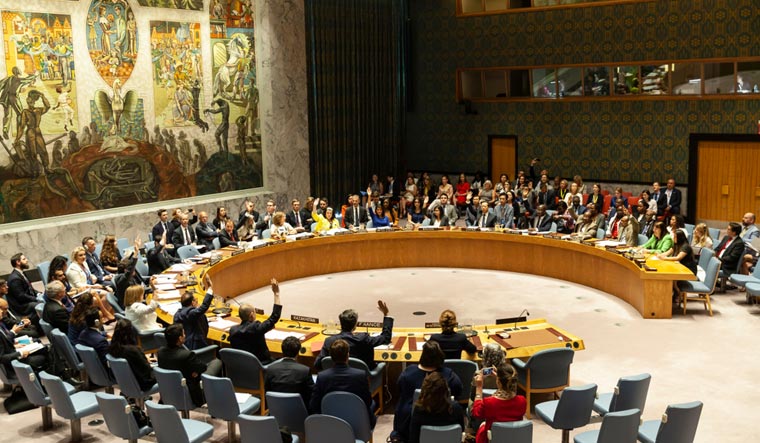The chief international envoy to Bosnia has warned that the war-scarred Balkan nation could face the biggest existential threat of the post-war period if the international community does not curb threatened separatist actions by Bosnian Serbs.
High Representative for Bosnia and Herzegovina Christian Schmidt was scheduled to deliver the warning in a briefing to the UN Security Council, but council said his appearance was canceled because of opposition from Russia, a close ally of Serbia and the Bosnian Serbs.
Schmidt said the prospects of further division and conflict are very real, if Bosnian Serb leader Milorad Dodik withdraws Serb troops from the Bosnian army and creates a separate Serb force, according to excerpts of his prepared briefing carried by Bosnia's Klix.ba portal. Those moves and other threats, if carried out, would "ultimately undermine the state's ability to function and carry out its constitutional responsibilities, Schmidt wrote.
Schmidt, a senior German diplomat, called Dodik's threatened actions tantamount to secession without proclaiming it. He said they endanger not only the peace and stability of the country and the region, but if unanswered by the international community could lead to the undoing of the agreement" that ended the Bosnian War in 1995.
A short history of the Balkans war
After the Second World War, the socialist state of Yugoslavia was created, stitiching together a pack of feuding ethnicities in Serbs, Slovenes, Croats, Bosnian Muslims and Kosovar Albanians under the leadership of President Tito. With sufficient freedoms and a relaxed regime, Tito was able to maintain peace between all the groups.
After Tito's death in 1980, old tensions re-emerged in the form of renewed calls for autonomy and independence from Yugoslavia. Croatia declared independence, as did Slovenia and Bosnia. What followed later was a series of brutal crackdown measures by the Yugoslavia army, which comprised mainly of the Serbs. The United Nations intervened with various measures, but to no avail.
Take the case of Bosnian war. The country is a very diverse mix of Serbs, Croats and Bosniak Muslims, the latter bearing the biggest brunt of the Serb crackdown. The Serbs in Bosnia, hand-in-hand with the Yugoslav army, pushed back against calls of independence from the Muslims and the Croats.
Then followed massive violence, including the Srebrenica massacre. Bosnian Serb forces pushed non-Serbs out of territories they sought for their Serb statelet. Fleeing Muslims took shelter in several eastern towns, including Srebrenica, that were designated as a United Nations "safe zones". On July 11, 1995, the Serb forces commanded by General Ratko Mladic overran Srebrenica, which was protected by lightly armed Dutch peacekeepers. They sent women and children away and captured and executed the men and boys they found. The bodies were dumped into mass graves and later exhumed by UN investigators.
NATO intervened, bombing the Serbs and putting them on the backfoot. The war ended with the independence of Croatia, Bosnia, Slovenia, Macedonia and Montenegro.
The UN war crimes tribunal convicted Mladic and his political chief Radovan Karadzic over Srebrenica genocide but they remained heroes for Serbs, many of whom deny that genocide happened.
What is the situation now?
The war created two regions, the Republika Srpska and the Bosniak-Croat Federation. The two regions were given wide autonomy, but kept some joint institutions, including the army, the top judiciary and tax administration. Bosnia also has a rotating three-member presidency made up of Bosniak, Serb and Croat members.
Dodik, the Bosnian Serb member of the presidency, has for years been advocating for the separation of the Bosnian Serb mini-state and having it become part of Serbia. Such a move would unlikely win support from the United States and much of the West.
Dodik, who has tacit support from Russia and Serbia, recently intensified his campaign, pledging that the Bosnian Serb parliament would by the end of November declare the creation of its own army, tax authority and judiciary.
He has threatened to take over the Bosnian army barracks located in the Serb half of Bosnia once the Bosnian Serb military is formed. He said if the West tries to intervene, he would call Bosnian Serb friends for help.
-Inputs from agencies




